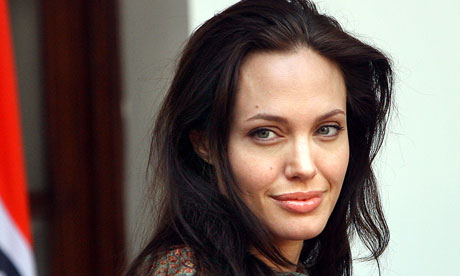News of the World private detective vows to expose tabloid stalker culture
Derek Webb pledges to give evidence for people he followed who want to sue News International
Derek Webb says he was paid to follow scores of people, including such celebrities as Angelina Jolie, Princes William and Harry, and Tom Watson MP. Photograph: Manish Swarup/Associated Press
A private detective employed by News International to put hundreds of people under surveillance has said he was commissioned by as many as 30 journalists working on the News of the World.
While surveillance is not illegal, Webb's pledge suggests that News International could find itself facing legal action from people who claim their privacy has been invaded – in addition to the scores of claims brought against it by victims of phone hacking. Webb's claims, which suggest there was a culture of surveillance that permeated the News of the World newsroom, are contained in a dossier detailing the work the former undercover police officer carried out for News International from 2003.
The dossier, containing the names of around 150 celebrities and scores of non-famous targets, will be submitted to the Leveson inquiry investigating journalistic practices later this week. They will also include details of one surveillance operation that Webb undertook on behalf of the Sun.
The footage of the two solicitors was apparently contained in a file found in the office of Tom Crone, News International's former legal executive. In September, Crone told a parliamentary inquiry into phone hacking only that he "may" have commissioned private investigators "a long time ago maybe".
Webb said he sent News International a dossier detailing his work for NoW after it refused to give him the 12 weeks' severance pay offered to other freelances when the paper closed.
"I thought, I'm not having this, so I sent a dossier on every single person I've worked for since 2003 to News International, and they told me to send my dossier back to the police. They're denying all knowledge of me, I think, because of the secret file I was involved with, the dossier about the solicitors."
Webb's decision to speak out has further muddied the waters swirling around News International, the police and the role of private investigators.
Webb was arrested in 2007 on the strength of false allegations claiming he was linked to police corruption. The case against Webb and a serving police officer from Hertfordshire was eventually dropped. But he claims much of the material seized by police, including his diaries, was not returned to him and that a computer hard drive was wiped.
Files apparently throwing doubt on the conviction of Kevin Lane, who was jailed for a gangland murder, were also not returned. The exact whereabouts of the files, which are believed to be stored by Hertfordshire police at the request of Thames Valley police who investigated Webb, are unknown. Webb said their contents could provide the Leveson inquiry with valuable information if they could be retrieved.
Webb was just one of several former police officers turned private investigators employed by the NoW. "I never met any of the others, I think that may have been deliberate," he said.
His submission to Leveson is likely to shine light on surveillance that appears to have taken place on an industrial scale at the newspaper. "It was mainly surveillance, following people," Webb said. "They didn't even employ me to photograph anyone, although I had a video camera: they'd always send a photographer. They had a copyright and, if they saw that some work was looking good, immediately they'd send down a photographer to me.
"I'd get a phone call from the news desk – there must have been 20 or 30 people who used to work there (that I worked for). I could do various jobs in a day and there might be three different journalists phoning up saying, 'We want you to go this address'."
The Leveson inquiry has sent Webb a detailed set of questions asking him to outline his covert surveillance for News International. He said that he would be prepared to act as a witness in any legal action the people he had tailed brought against News International. "If we get to a situation when they are saying, 'Are you willing to give evidence?' I'm definitely not going to say no. Why should I?"
He is planning to take News International to an employment tribunal. He said News International requested that he sign a confidentiality contract after he was arrested.
http://www.guardian.co.uk/media/2011/nov/19/news-ofthe-world-phone-hacking

